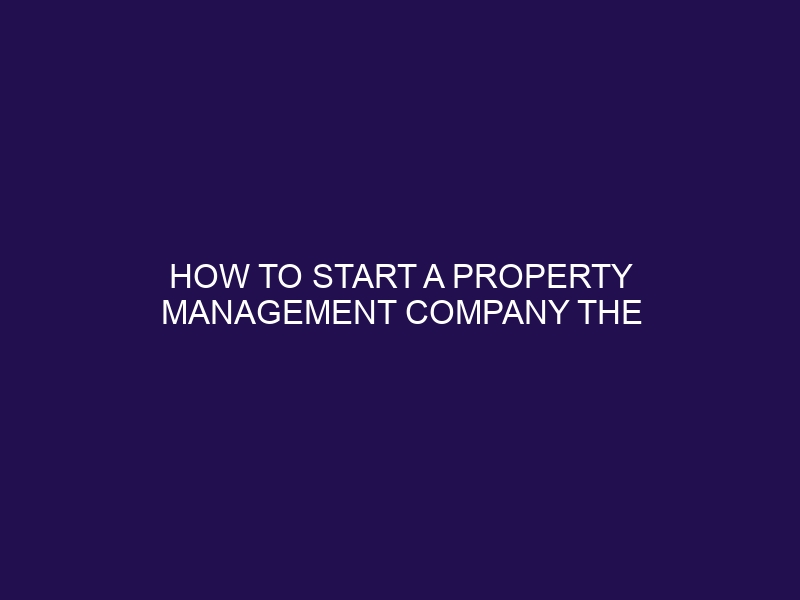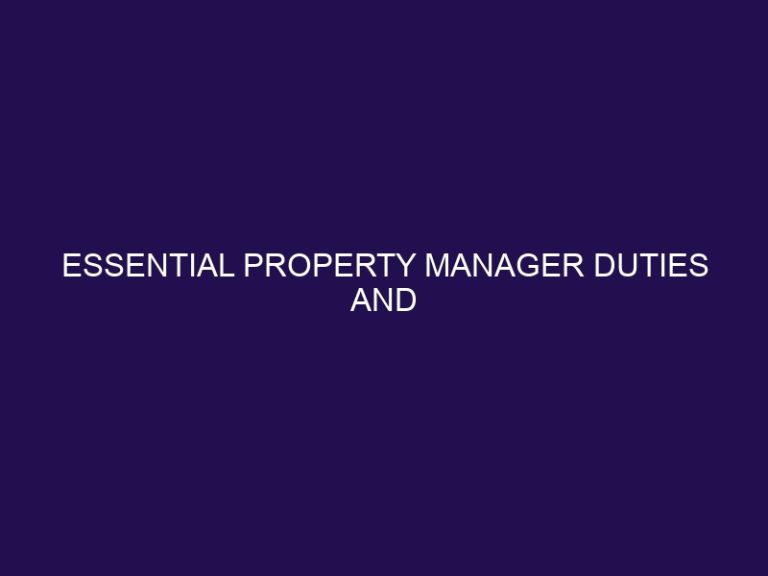How to start a property management company the right way [Canada]
Starting a property management company in Canada requires thorough knowledge of the industry and careful planning. This article will guide you through the process of establishing a property management company the right way, specifically tailored to the Canadian market.
Understanding the Property Management Industry in Canada
To embark on this journey, it is important to first understand what property management entails, the current market analysis, legal and regulatory framework, and industry trends and opportunities in Canada.
Building a Solid Foundation
Building a solid foundation is crucial for the success of your property management company. This section will cover important steps such as identifying your niche and target market, creating a well-structured business plan, and determining the appropriate legal structure for your company.
Meeting Legal and Licensing Requirements
Compliance with provincial and municipal licensing regulations is essential. This section will provide an overview of the specific legal requirements in Canada and guide you in obtaining the necessary licenses and permits.
Building a Professional Team
A competent and reliable team is vital for the smooth operation of your property management company. Learn how to hire property managers and staff, and establish collaborations with real estate agents, contractors, and suppliers.
Developing Effective Marketing and Branding Strategies
Proper marketing and branding strategies are essential for attracting clients and growing your business. Discover how to create a strong brand identity, leverage digital marketing techniques, and network effectively to build relationships within the industry.
Best Practices in Property Management
Learn about the best practices in property management, including effective tenant screening and leasing procedures, property maintenance and repairs, financial management, and dealing with challenges and conflict resolution.
Growth and Expansion
As your property management company matures, explore strategies for scaling and expanding your business, exploring new opportunities and markets, and prioritizing continuous learning and professional development.
By following these guidelines, you can start your property management company on the right foot and position yourself for long-term success in the Canadian market.
Understanding the Property Management Industry in Canada
Understanding the Property Management Industry in Canada
The property management industry in Canada is complex and ever-changing. To understand this industry, it is important to consider the following points:
- Regulations: Familiarize yourself with the provincial and federal regulations governing the property management industry in Canada.
- Market Analysis: Conduct thorough market research to understand the demand for property management services in your target area.
- Services Offered: Determine the range of services you plan to offer, such as rent collection, maintenance, and tenant screening.
- Competitive Landscape: Analyze your competitors to identify their strengths, weaknesses, and unique selling points.
- Networking: Build connections with industry professionals, such as real estate agents and landlords, to expand your client base.
In the early 2000s, the property management industry in Canada experienced significant growth due to an influx of foreign investments in real estate. As a result, property management companies witnessed a surge in demand for their services, leading to increased competition and innovation within the industry. This period of growth and expansion laid the foundation for the dynamic and thriving property management industry we see today in Canada.
What is Property Management?
What is Property Management?
Property management refers to the operation, control, and oversight of real estate properties on behalf of the owners. It involves various tasks such as marketing, tenant screening, lease agreements, property maintenance, financial management, and conflict resolution. Property managers act as intermediaries between landlords and tenants, ensuring that the properties are well-maintained and that rental agreements are followed. They handle the day-to-day operations of the properties, handle tenant issues, and collect rent payments. Property management is a crucial aspect of real estate investment, providing a professional and organized approach to property ownership and ensuring a steady stream of rental income.
Fact: Property management in Canada is a growing industry, with the Canadian real estate market valued at over $1.7 trillion in 2020.
Market Analysis of Property Management in Canada
A comprehensive market analysis of property management in Canada is crucial for starting a successful company in this industry. It provides valuable insights into the market size, competitive landscape, and growth potential of the business. By understanding these factors, aspiring property managers can make informed decisions and develop effective strategies for growth and profitability.
Specifically, the market analysis reveals the increasing demand for property management services in Canada, indicating a growing rental market. It also highlights the presence of established companies in the industry, emphasizing the competitive landscape. Additionally, the analysis identifies emerging technology solutions as a factor driving growth, along with the untapped potential of regional markets and the expanding commercial sector.
Moreover, it acknowledges the strong real estate market in Canada and recognizes government regulations and policies as important factors to consider. Lastly, the analysis underlines the high demand for property managers, indicating a promising opportunity for companies in this field.
Overall, a thorough market analysis is vital for property management companies in Canada. It allows them to position themselves for success by identifying opportunities for growth and profitability, as well as developing effective strategies to capitalize on them.
Legal and Regulatory Framework for Property Management in Canada
The Legal and Regulatory Framework for Property Management in Canada is a critical aspect to consider when establishing a property management company. It is essential to familiarize yourself with the provincial and municipal licensing regulations, as they vary across different regions in Canada. Obtaining the necessary licenses and permits required to operate legally is of utmost importance. Additionally, building a professional team that includes property managers and staff who are well-versed in the legal requirements and regulations is crucial. Collaborating with real estate agents, contractors, and suppliers who possess knowledge about the legal and regulatory framework is also recommended. By adhering to the legal and regulatory guidelines, property management companies can establish a strong foundation for their business and ensure compliance with Canadian laws.
Industry Trends and Opportunities
The property management industry in Canada offers numerous opportunities for growth and success, with a range of industry trends that can be capitalized on. By staying updated on these trends and adapting business strategies accordingly, you can position yourself for success. It is important to embrace emerging technologies and digital tools, as they can help streamline operations and improve tenant experiences. Additionally, exploring niche markets and specializing in property management services, such as student housing or short-term rentals, can provide unique opportunities for growth. It is crucial to stay informed about regulatory changes and compliance requirements to ensure that your business remains in line with industry standards. Building relationships with industry professionals, real estate agents, contractors, and suppliers can expand your network and open up new avenues for success. Furthermore, continuously investing in professional development and learning is essential to stay ahead in this ever-evolving industry. By capitalizing on these industry trends and opportunities, you can thrive in the property management sector.
Building a Solid Foundation
Building a property management company from scratch? Let’s lay the groundwork for success in this section. We’ll uncover your niche, identify your target market, and develop a solid business plan. Plus, we’ll dive into the best structure for your company. Get ready to set the stage for a thriving property management venture in Canada!
Identifying Your Niche and Target Market
Identifying Your Niche and Target Market
Identifying your niche and target market is of utmost importance when starting a property management company. It is crucial in order to focus your services and cater to the specific needs of your clients. Here are the key steps to consider:
1. Conduct comprehensive market research to effectively identify the gaps and opportunities within the property management industry.
2. Define your niche by specializing in a specific property type or by catering to a particular demographic.
3. Gain an in-depth understanding of your target market’s preferences, demands, and pain points to tailor your services accordingly.
4. Develop a compelling unique selling proposition that sets you apart from your competitors within your chosen niche.
By skillfully identifying your niche and target market, you can strategically position your property management company and successfully attract the right clients.
Creating a Business Plan
Creating a business plan is crucial when starting a property management company in Canada. Here are the essential steps to follow in order to ensure the success of your venture:
-
Identify your target market and niche within the property management industry.
-
Conduct thorough market research to gain an understanding of the competition, demand, and potential opportunities.
-
Clearly outline the goals and objectives of your business, including financial projections and growth plans.
-
Develop a comprehensive marketing strategy to effectively promote your services and attract clients.
-
Determine the optimal organizational structure for your company and clearly define roles and responsibilities.
-
Strategize your pricing and fee structure for property management services.
-
Create a well-structured budget and financial plan to ensure the financial stability and profitability of your business.
-
Identify and obtain any necessary licenses and permits required to legally operate as a property management company in Canada.
Remember that it is essential to regularly review and update your business plan as your company grows and evolves. This will help you stay on track and adapt to any changes in the market or industry trends. Success in the property management industry starts with a well-crafted business plan!
Structuring Your Company
Structuring Your Property Management Company
Incorporating the key steps below is crucial for the success and organization of your property management company:
- Determine your company’s legal structure: Whether it is a sole proprietorship, partnership, or limited liability corporation, it is essential to choose the right structure.
- Register your company: Ensure you comply with all legal requirements by registering your company with the appropriate government agencies and obtaining the necessary licenses and permits.
- Establish roles and responsibilities: Clearly define the responsibilities of your team members, including property managers and staff, to ensure everyone understands their duties.
- Create an organizational chart: Develop an organizational chart that outlines the hierarchy and reporting relationships within your company, providing a clear structure and framework.
- Develop standard operating procedures: Implementing standard operating procedures helps maintain consistency in operations and enhances overall efficiency.
Fact: Properly structuring your company sets a strong foundation for growth and expansion in the property management industry.
Meeting Legal and Licensing Requirements
When starting a property management company in Canada, it’s crucial to navigate the maze of legal and licensing requirements. From provincial regulations to municipal licenses, there are certain steps you must take to ensure compliance. In this section, we’ll break down the process, discuss the nuances of provincial and municipal licensing regulations, and explore the steps involved in obtaining the necessary licenses and permits. We’ll also touch on building a professional team, hiring property managers and staff, and collaborating with real estate agents, contractors, and suppliers to streamline your operations. Let’s dive in!
Understanding Provincial and Municipal Licensing Regulations
Understanding Provincial and Municipal Licensing Regulations is of utmost importance when establishing a property management company in Canada. These regulations play a significant role and differ based on the province and municipality, encompassing various aspects including licensing prerequisites, permits, and adherence to specific laws and regulations. It is imperative to thoroughly conduct research and comprehend these regulations to guarantee compliance with the law and steer clear of potential penalties or legal complications. To navigate the intricacies of these regulations and ensure a seamless and legally sound operation for your property management company, it is advisable to partake in industry-specific training and seek guidance from legal professionals.
Obtaining the Necessary Licenses and Permits
To acquire the necessary licenses and permits for establishing a property management company in Canada, follow these sequential steps:
- Conduct comprehensive research on the licensing regulations: Familiarize yourself with the provincial and municipal requirements for property management licenses.
- Identify the specific licenses and permits that are required: Based on your location and the range of services you offer, determine the exact licenses and permits needed.
- Complete the application process: Collect all the essential documentation and information, and submit a comprehensive application for the licenses and permits.
- Ensure payment of the required fees: Guarantee that you have paid all the necessary fees to proceed with the processing of licenses and permits.
- Attend any mandatory training or examinations: It is possible that certain licenses may necessitate the completion of training courses or the successful completion of an examination.
- Acquire the licenses and permits: Once your application has been processed and approved, you will receive the necessary licenses and permits to operate your property management company.
Building a Professional Team
Building a professional team is essential for the successful operation of a property management company in Canada. Here are the steps to create a strong team:
-
Identify the Roles: Determine the key positions needed, such as property managers, leasing agents, maintenance staff, and administrative support.
-
Recruit Talent: Advertise job openings, conduct thorough interviews, and assess candidates’ experience, skills, and compatibility with your company’s values.
-
Training and Development: Provide comprehensive training to ensure your team members have the necessary knowledge and skills. Offer opportunities for professional growth and continuing education.
-
Establish Clear Roles and Responsibilities: Clearly define each team member’s roles and responsibilities to avoid confusion and promote accountability.
-
Promote Effective Communication: Foster a culture of open communication, encourage feedback, and hold regular team meetings to discuss challenges and upcoming projects.
-
Encourage Collaboration: Emphasize teamwork and encourage collaboration among team members to ensure a cohesive and productive work environment.
-
Provide Resources and Support: Equip your team with the necessary resources, tools, and technology to perform their roles effectively. Offer support and guidance when needed.
-
Recognition and Rewards: Recognize and reward your team members for their hard work and achievements. Show appreciation to boost morale and motivation.
-
Continuously Evaluate and Improve: Regularly evaluate the performance of your team members and provide constructive feedback. Look for ways to improve team dynamics and efficiency.
Hiring Property Managers and Staff
Hiring Property Managers and Staff is an essential step in establishing a successful property management company in Canada. When considering potential candidates, there are several key factors to take into account.
- Experience: Look for individuals with relevant experience in property management and a proven track record in tenant relations, maintenance, and financial management.
- Qualifications: It is important to ensure that candidates possess the necessary certifications, such as a Real Estate License or a Property Management License.
- Skills: Seek out individuals who possess exceptional communication, organization, and problem-solving skills. These skills are crucial as they will be responsible for managing tenant inquiries, coordinating repairs, and handling property finances.
- Cultural fit: Evaluate potential hires for their compatibility with your company’s values and work environment. This assessment will guarantee a cohesive team and efficient operations.
Fact: According to a survey, hiring the right property manager can lead to a 20% increase in rental property profits.
Collaborating with Real Estate Agents, Contractors, and Suppliers
- Collaborating with real estate agents, contractors, and suppliers is crucial for a successful property management company in Canada. Here are some key reasons why:
- Access to a wider network: Real estate agents can provide valuable leads, connecting property managers with potential clients and tenants.
- Expertise and knowledge: Contractors bring specialized skills to handle maintenance and repairs, ensuring properties are well-maintained and attractive to renters.
- Cost-effective solutions: Collaborating with trusted suppliers allows property managers to secure quality materials and services at competitive prices, maximizing profitability for landlords.
- Streamlined operations: By working together, real estate agents, contractors, and suppliers can create a seamless workflow, simplifying property management tasks and enhancing client satisfaction.
History Example: One property management company in Canada successfully collaborated with a local real estate agent and experienced higher tenant retention rates and increased property values. By working closely with contractors, they were able to efficiently address maintenance issues, leading to improved tenant satisfaction and reduced vacancies. Their partnership with reliable suppliers ensured timely access to necessary materials, optimizing property operations. Consequently, their collaborative approach resulted in a thriving and profitable property management business.
Developing Effective Marketing and Branding Strategies
Looking to create a successful property management company in Canada? Let’s dive into the key aspect of developing effective marketing and branding strategies to fuel your growth. From crafting a strong brand identity to leveraging digital marketing techniques specific to property management, we’ll explore how to stand out in the competitive industry. We’ll discuss the importance of networking and building relationships to establish a solid client base. Get ready to make your mark in the property management world with these essential strategies.
Creating a Strong Brand Identity
Creating a Strong Brand Identity is of utmost importance for achieving success in the property management industry. It is vital to establish your brand values and mission in order to stand out from competitors. Additionally, it is crucial to craft an aesthetically pleasing logo and design a website that accurately portrays your brand identity. Developing a consistent brand voice that resonates with your target market is also a key consideration. Leveraging social media and online platforms to showcase your expertise and interact with potential clients is imperative. Providing exceptional customer service is essential to foster trust and loyalty. Moreover, encouraging positive reviews and referrals from satisfied clients significantly enhances your brand reputation. By prioritizing the creation of a strong brand identity, you can position your property management company as a trustworthy and dependable choice in the market. Notably, reputable companies such as Royal LePage and Brookfield Residential Properties have successfully built robust brand identities in the Canadian property management industry by emphasizing professionalism, reliability, and delivering exceptional customer service.
Digital Marketing Techniques for Property Management
Digital marketing techniques for property management are crucial to reach the target audience and enhance the online presence. Consider the following effective strategies:
- Create a user-friendly website showcasing the services and properties.
- Improve search engine rankings by optimizing the website with relevant keywords.
- Increase website traffic through search engine marketing (SEM) strategies like pay-per-click advertising.
- Engage with potential clients and share relevant content on social media platforms.
- Attract and educate potential clients with informative and visually appealing content, such as blog posts and videos.
- Nurture leads and keep existing clients updated through email marketing campaigns.
- Analyze the effectiveness of digital marketing efforts using data analytics tools.
Networking and Building Relationships
Networking and building relationships are essential for success in the property management industry. Here are some strategies to consider:
- Attend industry events and conferences to connect with professionals and potential clients.
- Join property management associations and organizations to establish connections with peers and learn from their experiences.
- Utilize social media platforms to actively engage with industry influencers, share valuable insights, and expand your network.
- Develop partnerships with real estate agents, contractors, and suppliers to create a referral network and offer additional services to clients.
- Establish yourself as a thought leader and expand your credibility within the industry by providing educational resources and hosting workshops.
Best Practices in Property Management
Discover the secrets of successful property management with these best practices. From effective tenant screening and leasing to property maintenance and repairs, financial management and reporting, and dealing with challenges and conflict resolution. Learn how to navigate the world of property management the right way, ensuring a smooth and profitable operation. Stay tuned as we share valuable insights and strategies to help you excel in this dynamic industry.
Effective Tenant Screening and Leasing
- Implement an effective tenant screening and leasing process for your property management company in Canada by following a systematic approach.
- Use diverse platforms, such as online listing websites and social media, to effectively advertise and reach potential tenants.
- Thoroughly screen applicants to ensure the best tenants for your properties by conducting comprehensive background checks, including credit and employment history, rental references, and criminal records.
- Assess the compatibility and responsibility of prospective tenants through face-to-face interviews.
- Verify the accuracy of information provided by applicants, including income and rental history, to make informed decisions.
- Create a legally binding lease agreement that clearly defines the terms and conditions of the tenancy.
- Take security deposits from tenants as a precautionary measure against potential damages or unpaid rent.
- Prior to the tenant’s move-in, perform a detailed inspection of the property to document its condition.
- Provide a comprehensive orientation to the tenant, explaining important details about the property and its amenities.
- Maintain a strong landlord-tenant relationship by fostering open communication throughout the lease term.
Property Maintenance and Repairs
- Regular property maintenance and repairs: Conduct routine inspections to identify and address maintenance issues in a timely manner.
- Prompt property repairs: Respond promptly to repair requests from tenants to ensure their satisfaction and prevent further damage.
- Preventive property maintenance: Implement a proactive maintenance schedule to prevent major issues and extend the lifespan of property components.
- Landscaping and groundskeeping for property: Maintain the exterior appearance of the property by landscaping and regular upkeep of common areas.
- Contractor management for property repairs: Coordinate with reliable contractors for specialized repairs and ensure their work meets quality standards.
- Emergency response for property maintenance: Have a plan in place to handle emergency maintenance situations, such as plumbing or electrical issues.
Throughout history, property maintenance and repairs have been essential to ensure the longevity and functionality of buildings and infrastructure. From ancient civilizations maintaining their temples and palaces to modern times where property management companies uphold the same principles, the importance of property maintenance and repairs has remained constant. A well-maintained property not only ensures the comfort and safety of tenants but also contributes to its overall value and attractiveness. Successful property management involves staying proactive, addressing issues promptly, and ensuring regular property maintenance and repairs to provide a satisfactory living or working environment for all occupants.
Financial Management and Reporting
Effective financial management and reporting play a crucial role in the success of a property management company. They are essential to ensure accurate records, track expenses, and maximize profitability.
| Key Aspects of | |
| 1. Financial Management: | Implement strategies to effectively manage and handle financial resources. |
| 2. Reporting: | Create and maintain precise financial records and conduct regular audits to ensure compliance and transparency. |
| 3. Rent Collection: | Establish streamlined processes for collecting and recording rent payments to ensure a steady cash flow. |
| 4. Expense Tracking: | Monitor and categorize expenses, such as maintenance, repairs, and utilities, to identify opportunities for cost-saving. |
| 5. Performance Evaluation: | Generate comprehensive financial reports, including income statements and balance sheets, to assess performance and make informed decisions. |
| 6. Tax Compliance: | Stay updated with tax regulations and fulfill tax obligations accurately and punctually. |
By implementing strong financial management and reporting practices, property management companies can optimize their financial performance and deliver dependable services to their clients. Historical data shows that companies with robust financial management have a greater likelihood of achieving long-term success and growth.
Dealing with Challenges and Conflict Resolution
Dealing with challenges and conflict resolution is a crucial component of operating a successful property management company in Canada. Here are some effective strategies to address these issues:
Growth and Expansion
Ready to take your property management business to the next level? In the Growth and Expansion section, discover the secrets to scaling your business, exploring new opportunities and markets, and the importance of continuous learning and professional development. Get ready to unlock new horizons and propel your property management company towards success in the Canadian market. Let’s dive in and explore the thriving world of growth and expansion in property management.
Scaling Your Property Management Business
Scaling your property management business is crucial for long-term success and profitability. To achieve this, here are some key strategies to consider:
-
Diversify your portfolio: Expand your property management services to include different types of properties such as residential, commercial, or vacation rentals to scale your business effectively.
-
Invest in technology: Implement property management software to streamline operations, automate tasks, and improve tenant communication, which plays a vital role in scaling your property management business.
-
Build a strong team: Hire qualified property managers and support staff to handle the increased workload and provide excellent customer service, contributing significantly to scaling your property management business.
-
Develop strategic partnerships: Collaborate with real estate agents, contractors, and suppliers to enhance your service offerings and expand your network, a proven way to scale your property management business.
-
Improve marketing efforts: Utilize digital marketing techniques, such as social media advertising and search engine optimization, to attract new clients and tenants, an essential aspect of scaling your property management business.
-
Focus on customer satisfaction: Prioritize tenant retention by providing exceptional service, responding promptly to inquiries, and addressing maintenance issues promptly. This customer-centric approach is crucial for scaling your property management business.
Exploring New Opportunities and Markets
When it comes to building a successful property management company in Canada, the key to growth and expansion lies in naturally incorporating the concept of exploring new opportunities and markets. Here are some important considerations to keep in mind:
– Conduct thorough market research to identify emerging markets and untapped opportunities in different areas or property types.
– Stay informed about industry trends and seamlessly adapt your services to cater to changing demands and needs.
– Foster meaningful connections by networking with real estate agents, contractors, and suppliers, thereby expanding your business connections and gaining access to new markets.
– Embrace a continuous learning mindset by educating yourself and your team on industry developments and best practices. This proactive approach ensures that you stay ahead of the competition.
By actively exploring new opportunities and markets, you strategically position your company for long-term success and profitability.
Continuous Learning and Professional Development
Continuous learning and professional development are essential in the property management industry. It is crucial to stay updated on industry trends, regulations, and best practices in order to succeed. One way to accomplish this is by attending industry conferences and seminars, which provide valuable insights and knowledge. Joining professional organizations and networks is another effective means to connect with peers and learn from experienced professionals. Additionally, taking advantage of online courses and certifications can enhance skills and expand expertise. Interestingly, according to a survey, property managers who invest in continuous learning and professional development are more likely to achieve higher client satisfaction and experience business growth.
Frequently Asked Questions
1. How do I start a property management company in Canada?
Starting a property management company in Canada requires extensive education and certifications, such as the Certified Property Manager® designation. You will also need to set a budget, establish factors such as initial capital and licensing, and create a professional website and social media presence.
2. What licenses and registrations do I need to start a property management company in Canada?
To establish a property management business in Canada, you will need to obtain licensing and registration. Options for licensing property managers include college programs and courses from the Institute of Housing Management. Additionally, a business license is required to ensure legal recognition of the company.
3. How important is having a website and social media presence for a property management company?
In today’s digital age, having a professional and informative website is crucial. It acts as the first impression potential clients have of your company. Social media presence is also important for networking, sharing industry news, and demonstrating knowledge and commitment to the real estate industry.
4. Are there any codes of ethics that property management companies in Canada must follow?
Yes, property management companies in Canada must operate under strict codes of ethics. For example, the Condominium Management Regulatory Authority of Ontario (CMRAO) outlines a code of ethics that includes treating owners, companies, and tenants fairly, maintaining required records, and being financially accountable. Other regulatory bodies may have their own codes of ethics as well.
5. How can I build credibility and attract clients for my property management company?
Building credibility and attracting clients for your property management company can be achieved through various strategies. Joining relevant associations, such as the Real Estate Council of Alberta or the Building Owners and Managers Association BC, can help establish credibility. Additionally, investing in marketing tools like Google AdWords and utilizing search engine optimization (SEO) can help increase your visibility and attract clients.
6. What are the essential ingredients for building a successful property management firm?
Building a successful property management firm requires hard work, dedication, and the right skills. Essential ingredients include choosing the right location for your office, building a professional website, joining relevant property associations, investing in marketing and sales strategies, and operating under a strict code of ethics. Additionally, comprehensive education, certifications, and developing strong interpersonal skills are crucial for success in this industry.







